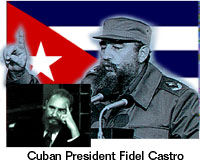|
|
|
 |

 |
12 October 1997
The allure of romantic revolution is timeless. Its appeal captures both old and young.
For the dozen or so Malaysians who accompanied Prime Minister Dato' Seri Dr Mahathir
Mohamad and who attended the bilateral meeting with Cuban President Fidel Castro
and later dined with him in Havana on Friday, Sept 26, it was like a date with history.
 It was a historic lifetime opportunity to meet the
Latin Legend who captivated the West and East alike, which had voraciously recorded
the Cuban revolution and the man who led and still leads it after 40 years. Indeed
to many people - friends and foes alike - Castro is history and a Latin American
epic. It was a historic lifetime opportunity to meet the
Latin Legend who captivated the West and East alike, which had voraciously recorded
the Cuban revolution and the man who led and still leads it after 40 years. Indeed
to many people - friends and foes alike - Castro is history and a Latin American
epic.
The Cuban revolution is struggling between relaxing political control while simultaneously
welcoming and encouraging free market economy. Judging by Castro's determined six
hour-and-forty-minute speech to the Cuban Community Party Congress last Wednesday,
the Cuban revolution shall survive and prosper because Castro, it seems, is doing
the right thing - following the Chinese way, not the Russian method - to usher Cuba
into the third millennium.
What about the American economic embargo against Cuba for the last 37 years? Well,
I hardly believe in economic sanctions against any nation because it rarely ever
achieves its objective. The most likely effects are damage to American companies
and their economic interests, which mean fewer jobs for American workers. Like Mahathir,
I believe we should trade with everybody to enrich the economy of everyone. Besides,
"positive engagement" is better than no engagement or alienation.
I did not encounter any difficulty in Havana and Veradero - as long as I had US dollars
- to buy many American and European products, almost anything. This was made possible
since the Cuban leader began allowing transactions in foreign currencies in 1994.
As a result, a twin economy has developed - one business done in Cuban pesos, and
the other in dollars or in whatever acceptable currency.
The only difference seems to be the availability of goods - fewer choices posed by
the scarcity of a struggling economy for those who only have pesos.
Life may appear austere for many Cubans but there seems to be enough food Cubans
look healthy and happy. Cuban socialism is still very much in evidence it still resonates,
especially in the rural areas.
At my hotel, the five-star Melia Cohiba, I had a good selection of cable television,
including CNN besides Cuban TV and Radio. The US embargo has hurt Cuba. No doubt
here. Of course, it has been a painful experience for Cuba and its people, but it
has also been harmful to American political prestige and caused losses to US companies
and land and house owners.
Fidel Castro is one of the two of this century's great and romantic figures still
alive. The other is the embattled and striving Yasser Arafat, the Palestinian chieftain.
The rest of his revolutionary contemporaries have long been dead: Tito, Nasser, Sukarno,
Zhou Enlai. I believe Ahmad Ben Bella is still alive. I met all of them except Tito
and Nasser.
Castro took arms to create Communist Cuba, the first in Latin America that was made
to last. Cuba is one of the four communist countries still in existence the others
are China North Korea and Vietnam.
Entering its 39th year last July, though no longer economically supported by Russia
and its allies, Cuba remains a united nation even if it is much less affluent than
Chile, Uruguay, and Argentina, in particular. But, then, the stages of development
of the three Latin democracies we visited also varied.
The Latin democracies in the Caribbean have long learnt to "live and let live"
with Castro. The United States tried and failed to stop the Cuban revolution nor
could it wipe it out.
An Asian diplomat I met at Castro's reception in honour of Mahathir told me, unasked:
"Ideology and revolution are now part of the Cuban psyche. Changes will take
place but Cuba will remain a communist bastion ...; it is difficult for US to bring
Cuba to its knees."
Has Castro improved the lot of Cubans? It depends on who you talk to, and the person's
honesty and perception. There is no doubt Havana is not Buenos Aires, not even Montevideo,
and Veradero is not Costa Smeralda (in Sardinia).
True, Havana has no Hard Rock Cafes and Planet Hollywood restaurants but it has their
equivalent. One is situated in the hotel where I stayed. But what struck me most
was that Havana was peaceful, its citizens warm and friendly, no traffic hassle,
and eating, shopping and entertainment (plenty of this) are comparatively cheap.
Imagine what one has to pay in Buenos Aires (one of the most expensive cities in
the world). Havana is one of the cheapest cities in the world; visit it while the
situation lasts!
The Malaysian delegation was told that illiteracy has been wiped out and so has dengue
fever. Malaria is non-existing, AIDS is hardly a problem, and that Cuba had made
great progress in medicine, biotechnology, sports, agriculture and in pharmaceuticals.
We listened in admiration.
A few shook their heads at the neglect of rows of beautiful and historical edifices
and buildings in Havana, especially in Old Havana. A Malaysian minister asked, "Why
the neglect?" The accompanying top Cuban official just said: "No funds
for repair, no money to buy paints which are expensive here and we do not produce
enough paints ourselves."
|

|
|
|
|